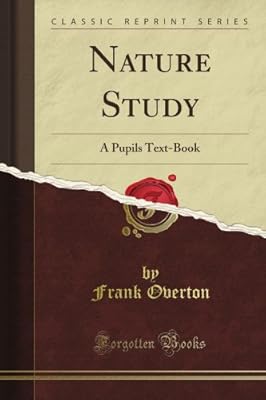Nature Study: A Pupil's Text-Book (Classic Reprint)
Price:
$10.87
Availability:
Not Available - stock arriving soon
Product Information (more info)
CERTAIN CONTENT THAT APPEARS ON THIS SITE COMES FROM AMAZON SERVICES LLC. THIS CONTENT IS PROVIDED 'AS IS' AND IS SUBJECT TO CHANGE OR REMOVAL AT ANY TIME.
Manufacturer Details
English. No one seemed to realize that this was a double task that, like Janus, faced in opposite directions. Either way by itself was sufficiently difficult; but for a pupil to follow both simultaneously was quite impossible. Even to-day an inexperienced teacher too often regards English as the material for the manufacture of ideas rather than as a medium for expressing them. Thus it often happens that, in our elementary schools, the language lessons are a weary work and a strain on both teacher and pupil. The seemingly natural plan of letting the child express his own thoughts in language either spoken or written marks a new era in the teaching of English. When we go a step farther and confine the language work to those subjects which must interest the child, we shall have ideal conditions. The correlation of nature study with language lessons is almost inevitable. The child sees certain living creatures and is interested in their life and habits and almost involuntarily he tells what he sees; if the teacher is in sympathy with him, he likes quite as well to write about his observations as to tell about them. And since he is trying to express only what he knows and has experienced, his English is simple and straightforward ;and, even when it is faulty, it may be corrected better by good example than by that ogre of school work in English, the blue pencil.
(Typographical errors above are due to OCR software and don't occur in the book.)
About the Publisher
Forgotten Books is a publisher of historical writings, such as: Philosophy, Classics, Science, Religion, History, Folklore and Mythology.
Forgotten Books' Classic Reprint Series utilizes the latest technology to regenerate facsimiles of historically important writings. Careful attention has been made to accurately preserve the original format of each page whilst digitally enhancing the aged text.
(Typographical errors above are due to OCR software and don't occur in the book.)
About the Publisher
Forgotten Books is a publisher of historical writings, such as: Philosophy, Classics, Science, Religion, History, Folklore and Mythology.
Forgotten Books' Classic Reprint Series utilizes the latest technology to regenerate facsimiles of historically important writings. Careful attention has been made to accurately preserve the original format of each page whilst digitally enhancing the aged text.







